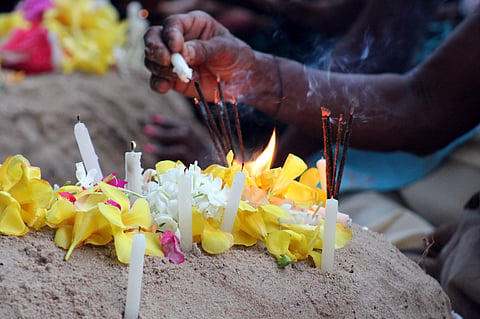The devastating poetry of Tamil women who fought in Sri Lanka’s civil war
IN CONVERSATIONS WITH former combatants from Sri Lanka’s 26-year civil war, it is small, seemingly innocuous interactions which trigger astonishing memories. Like the man whose toothache one day suddenly made him reveal how, decades earlier, he had had several teeth removed to make room for a cyanide capsule that he kept in his mouth, to be swallowed so as to avoid capture. Or the woman picking a scrap of paper off the floor who turned to me and explained that doing so was a lifelong habit because anything left behind in the jungle could betray their position to the enemy. I am treated like a custodian, documenting, archiving and safeguarding people’s recollections before they fade again.
For the last eight years, I have overseen a small charity in London that assists those who have fled Sri Lanka and now live in the United Kingdom and Europe. It’s a discreet initiative – for security reasons, but also for the privacy of those who come to share their memories and testimony every week – that emerged from a consultation process conducted to feed into the transitional justice process that started in Sri Lanka in 2015. That process revealed that Sri Lankan Tamil victims of conflict and torture who fled the country during and after it’s brutal civil war were not able to access basic social services in the United Kingdom. The project, as an attempt to address this, began with basic English classes for just five nervous men and women perched atop stools around one desk in a tiny study up three flights of stairs. The first students were far too polite to complain about the ramshackle surroundings. The gatherings were not just about teaching them English; they were an experiment to see if they would even come, if they wanted to sit with each other and could still learn despite their very high levels of post-traumatic stress. In my wildest dreams I hadn’t imagined the sheer ambition of the teachers and the hunger of the students to learn – or that, nearly a decade later, there would still be broken people approaching the project in need of healing, having survived civil war, defeat, detentions, torture, sexual violence, human smuggling, exile and poverty. The project offers people fragmented by these experiences – as well as solitary confinement, stigma, exile and more – entry into a community that is led by survivors like themselves. The fact that earlier participants, after a while, start to look after the newcomers is a strong indication of their recovery, even if partially.

